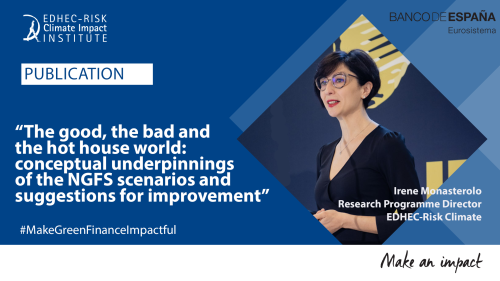
The good, the bad and the hot house world: new paper out by Irene Monasterolo with Banco de España
Written on 07 Feb 2023.

We are very pleased to share with you new Banco de España paper by Irene Monasterolo, Professor of Finance EDHEC Business School, and Research Programme Director at EDHEC-Risk Climate Impact Institute entitled "The good, the bad and the hot house world: conceptual underpinnings of the NGFS scenarios and suggestions for improvement" with María J. Nieto (Banco de Espana) and Edo Schets (Bloomberg), which focuses on NGFS scenarios, and more specifically on the characteristics and assumptions of the models that generated them, and their implications for financial risk assessment.
Climate mitigation scenarios are an essential tool for analyzing the macroeconomic and financial implications of climate change (physical risk), and how the transition to a low-carbon economy could unfold (transition risk). The Network for Greening the Financial System (NGFS) has co-developed a set of climate mitigation scenarios for climate financial risk assessment. Despite the important role that these scenarios play in climate stress tests, the understanding of their main characteristics and limitations is still poor.
In this paper, authors contribute to filling this gap by focusing on the following issues:
- comparison of the process-based Integrated Assessment Models (IAMs) used by the NGFS with alternative models;
- the role of Representative Concentration Pathways (RCPs) and Shared Socioeconomic Pathways (SSPs) in shaping the scenario narratives, and their shortcomings;
- the interpretation and sensitivities of carbon price pathways;
- comparison with other climate mitigation scenarios.
Authors then draw lessons on how to increase the relevance of the NGFS scenarios. These include:
- updating the SSP narratives;
- considering the potential trade-offs between different types of climate policies;
- assessing acute physical risks and their compounding;
- integrating physical risks within transition scenarios;
- taking into account the role of the financial sector and investors’ expectations.
TOPICS: NGFS scenarios, climate finance, climate transition risks, climate physical risks, integrated assessment models, carbon pricing, climate financial risk assessment.
The key findings of this paper were presented at the Scenarios Forum 2022. The views expressed here are those of the authors and do not necessarily represent those of Banco de España, the Eurosystem or Bloomberg LP. Irene Monasterolo acknowledges the support of the European Union’s Horizon 2020 research and innovation programme [CASCADES, grant number 821010] and of Boston University’s Global Development Policy Center Task on Climate Policy for Development at the International Monetary Fund.

